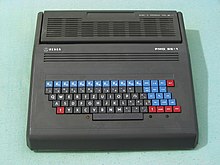Loading AI tools
From Wikipedia, the free encyclopedia
The PMD 85 is an 8-bit personal computer produced since 1985 by the companies Tesla Piešťany and Tesla Bratislava in the former Czechoslovakia.[1][2][3][4]
 PMD 85-1 | |
| Manufacturer | Tesla Piešťany |
|---|---|
| Type | Personal computer |
| Release date | 1985 |
| Operating system | BASIC |
| CPU | MHB8080A @ 2.048 MHz |
| Memory | 48 KB RWM, 4 KB ROM |
| Display | TV output or RGB component video; 288×256 resolution; 4-level attribute selectable per 6-pixel-wide areas |
| Related | MAŤO, Didaktik Alfa and Beta, Consul 2717 |
The production was local, due to a lack of foreign currency for purchasing systems from the West.[citation needed]
They were deployed en masse in schools throughout Slovakia,[5] while the IQ 151 performed a similar role in the Czech part of the country. The first Czechoslovak video games were created on the PMD 85 (other platforms were ZX Spectrum and Atari).
Several variants were developed (PMD 85-0, PMD 85, PMD 85-2, PMD 85-2A, PMD 85-3), with slightly different specifications and compatibility.[6][7][8][9][10][11][12][13][14][15]
In 1986 compatible machines were introduced by Didaktik:[16] Didaktik Alfa 1 (a PMD 85-1 clone) and Didaktik Alfa 2 ( a PMD 85-2 clone).[17][18][19] Didaktik Beta was a slightly improved Didaktik Alfa, having almost identical hardware.[20] Didaktik Alfa and Beta were mostly deployed in schools to replace older PMD 85 computers.
After the Velvet Revolution of 1989 the computer market opened. The PMD 85 was not competitive in terms of quality or features to foreign machines and production stopped.
The PMD 85-2 was an inspiration for the MAŤO personal computer, released in 1989 as a self-assembly kit. It had different hardware and very limited compatibility - BASIC, memory structure and I/O were almost similar, but the tape format was different. It was intended as a home computer, but never really caught on.
The same year ZBA, a company from Brno, introduced the Consul 2717, another PMD 85-2 clone, sold to schools.[21] Production of this machine ended in 1990.[21]

Seamless Wikipedia browsing. On steroids.
Every time you click a link to Wikipedia, Wiktionary or Wikiquote in your browser's search results, it will show the modern Wikiwand interface.
Wikiwand extension is a five stars, simple, with minimum permission required to keep your browsing private, safe and transparent.